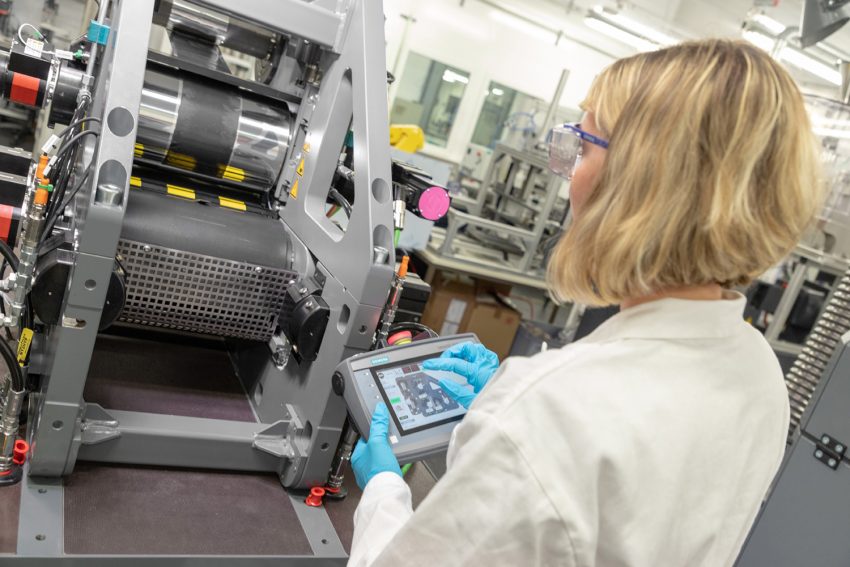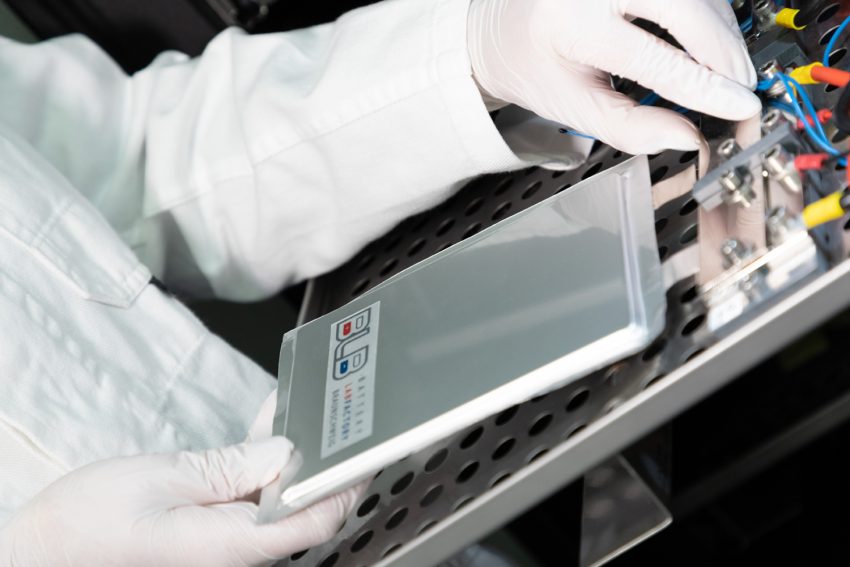New learning factory “Circular Battery Cell Production” comes to TU Braunschweig Learning environment for education and training being created for 3.7 million euros
With the learning factory “Circular Battery Cell Production”, a training centre for future specialists and scientists is being created at Technische Universität Braunschweig. In the learning factory, the skills and abilities of all process steps for the production of battery cells up to recycling are to be taught in an application-oriented manner in the sense of “Circular Battery Production”. The many years of experience of TU Braunschweig in the field of learning factories and battery cell production are incorporated in the construction of the learning factory, which is funded by the Federal Ministry of Education and Research (BMBF) with 3.7 million euros.

The machines and plants are connected to a digital twin to combine virtual and real learning content. Photo credit: Marisol Glasserman/TU Braunschweig
Battery cell production has a key role in the mobility transition. In the coming years, the production capacities for battery cells will be massively expanded, especially in Germany and Europe. This will lead to an enormous demand for skilled workers. At the same time, the realisation is gaining ground that sustainable and, above all, energy- and resource-efficient battery cell production requires the closing of material and substance cycles in the sense of a “circular economy”. However, this presupposes that future specialists and in particular scientists can learn the relevant skills and abilities at an early stage. In future, the “Circular Battery Cell Production” learning factory will offer this training and further education with a teaching-learning environment based on real production and value-added processes.
Modular learning stations
“In the future, battery systems must be considered as part of a holistic cycle system to ensure sustainability and security of supply,” says Professor Christoph Herrmann, one of the three coordinators of the learning factory. “The skills required for this in manufacturing and for recycling are to be taught in a practical and application-oriented manner in the new learning factory.”
The central elements of the “Circular Battery Cell Production” learning factory are modular learning stations, each of which depicts individual process steps and can be flexibly combined into process chains. The necessary production steps from the starting materials to the finished battery cell, from quality control to use and recycling can be learned and carried out in practice. The holistic view of the factory system is also represented by the inclusion of technical building equipment, such as ventilation systems and air conditioning. The systems are embedded in a virtual environment so that individual processes can also be flexibly integrated as virtual learning stations. This allows the teaching and learning environment to be quickly adapted to different issues and future trends.

The new learning factory will teach the skills needed for the sustainable production of battery cells. Photo credit: Marisol Glasserman/TU Braunschweig
Sustainability is the focus
Conceptually, the learning factory is based on the principle of research-based learning. This means that different qualification measures can be offered, each geared to the latest findings from research and the needs of industry. New technologies and methods of battery cell production can be integrated into the test environment at an early stage and made accessible for qualification. Important topics that will also be addressed in the learning factory include the energy- and resource-efficient production of battery cells, reuse options and recycling processes for used batteries, Industry 4.0 for the intelligent design of processes and the recycling of products and materials. For this purpose, a continuous quantitative sustainability assessment is to be installed.
The embedding and connection of the infrastructure to the existing learning factory at the Institute of Machine Tools and Production Technology and to the Battery LabFactory ensure rapid construction and commissioning. By involving the industry, the new learning factory should also take on the role of an important link in the regional innovation ecosystem for battery cell production. In this way, both education and training at TU Braunschweig can be strengthened and new formats of cooperation with the industry can be developed.
“The training and further education opportunities in the new learning factory for circular battery cell production will contribute to strengthening Germany as a technology and production location via qualified specialists,” says Professor Herrmann. A key success factor and differentiator for the German battery industry will be the sustainable use of resources such as materials, energy and the environment.
The construction is being funded with around 3.7 million euros by the Federal Ministry of Education and Research (BMBF) as part of the umbrella concept “Research Factory Battery” (FKZ 03XP0479). The commissioning of the new learning factory is planned for 2024.
The learning factory at TU Braunschweig is intended to have a central location and in principle offer all interested parties the opportunity to contribute teaching and learning content. The project is coordinated by Professor Dr.-Ing. Christoph Herrmann and Professor Dr.-Ing. Klaus Dröder, both from the Institute of Machine Tools and Production Technology, and Professor Dr.-Ing. Arno Kwade from the Institute for Particle Technology. For the implementation and design, the coordinators use the many years of experience of TU Braunschweig in the field of learning factories and battery cell production starting from the BatteryLab Factory Braunschweig (BLB).
